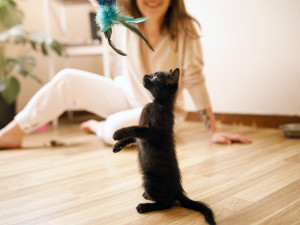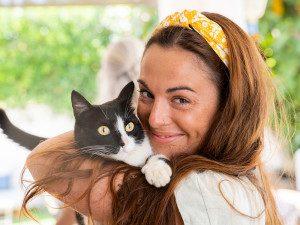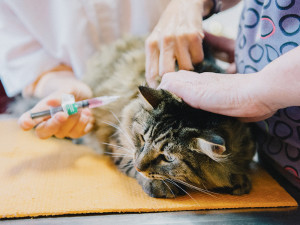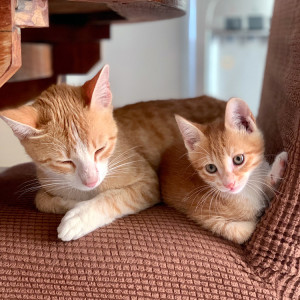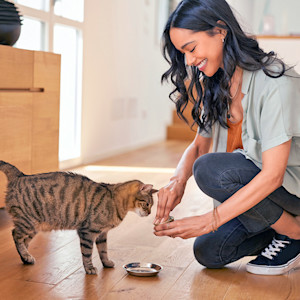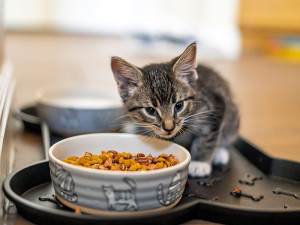When Can a Kitten Leave Their Mom?
And why it’s important for their health to stay with her as long as possible.

Share Article
In This Article:
How Old Should a Kitten Be to Leave Their Mom? Risks of Early Separation Ideal Kitten Adoption Age Supporting a Newly Adopted Kitten
Kittens grow up so fast; one day they can practically fit in the palm of your hand, and the next, they’re hitting the catnip canteen. Many important milestones occur within the first few weeks of life, and they receive many critical benefits from staying with their mom in those early weeks.
The process of transitioning kittens from nursing to eating solid food is known as weaning. And while kittens can learn to eat solid food, or at least mushy food, as early as about four weeks old, there are many good reasons to postpone weaning until they are older and to keep kittens with their mom and littermates.
Mamma cats, known as Queens, provide many invaluable benefits to young kittens through nursing, general care, and lessons in socialization. Whenever possible, the longer kittens can stay with their moms and littermates, the better.

How old should a kitten be to leave their mom?
In a perfect world, kittens should stay with their moms until they are about 10 to 12 weeks old. In many cases, this is not practical or possible for very legitimate reasons, however. In each case, the benefits of staying with mom longer need to be weighed against the benefits of separating them earlier. Here are some of the reasons that extra time together is so important:
Nutritional needs: Mother’s milk provides the best complete and balanced source of nutrition for growing kittens. It also contains crucial immune factors that protect baby kittens from infections while their own immune systems are immature. While most kittens will naturally start to wean around six weeks old, it tends to be a gradual process, in which they start eating some solid food while continuing to nurse less and less over the course of a few weeks. This gives them the benefit of all those vital nutrients in milk as they transition to eating solid food.
Socialization and behavioral development: When it comes to kittens, mama knows how to raise ‘em right. Mother cats keep their kittens in line and nip bad behaviors in the bud. Kittens who get too feisty and bite or pounce on mom get sternly but gently corrected. This helps them learn how to interact properly with other cats and reduces aggression in the long-run. Staying with their littermates longer also plays an important role in their socialization. This early playgroup teaches cats important social cues, how to play, and how to read other cats’ body language.
Physical and cognitive development: Kittens who remain with their littermates and mom longer have more opportunities to learn from them. This includes learning how to interact socially, as well as learning normal kitten behavior such as how to play, hunt, climb, and wrestle. Additionally, early separation can be very stressful for both mom and kittens, and stress can have negative impacts on development as well as physical and emotional health in the long-term.
Risks of early separation
If you have seen teeny floofy baby kittens, you know how adorable they are, and that may have you wondering, what is the youngest age you can adopt a kitten? The answer is that it depends. While the ideal age for separating kittens from their mom is closer to 10 to 12 weeks old, many kittens may have to be separated much earlier for a number of reasons.
Sometimes, kittens are orphaned early because their mom dies or stray kittens are found without a mom. If they are too young to eat solid food, they have to be bottle-fed with special kitten formula until they are old enough to eat on their own. Other times, crowded animal shelters make the choice to wean and separate kittens earlier in order to find them homes and save their lives. Most of the time, these kittens are adopted out at eight weeks old and older.
However, stray kittens or kittens from backyard litters may be found even earlier and sometimes, no other option is available. And while most cats that are separated early will be just fine, there are some important things to know about the risks of early separation:
Risk of inadequate nutrition and immune support: Kittens that need to be bottle-fed because their mother is unable to nurse them, or they are orphaned, are at greater risk for complications related to nutritional deficiencies and immune support. Mother’s milk is the ideal source of nutrition for kittens and formula lacks some of these benefits.
Additionally, bottle-fed kittens can be challenging to care for as they need round-the-clock feedings. Very young kittens also need support to maintain their body temperature and to urinate and defecate. For all of these reasons, very young kittens who are cared for without a mother cat face more challenges to survive.Behavioral issues: Bottle-fed kittens and kittens who are weaned early are also known to have higher rates of certain behavioral issues. This includes behaviors like wool-sucking, or pretending to nurse on cloth and other fabrics, even as adults, as well as challenges like aggression and inappropriate play. This is often attributed to the lack of socialization that naturally occurs between littermates as well as between kittens and their mothers.
Stress: The process of weaning is stressful for kittens and their moms, especially if it is abrupt. As kittens mature and start to eat some solid food, they naturally nurse less. This allows for a gradual weaning process over a few weeks; this way, they slowly replace nursing with eating more solids and mother cats offer fewer opportunities to nurse over time until they stop completely.
When young kittens are weaned suddenly and separated from their mothers and littermates, it is a very distressing experience. This can have long-term consequences for these kittens, the effects of which are still being studied.
Ideal kitten adoption age
What is the best age to adopt a kitten? That depends on many factors. Of course, allowing kittens to stay with their mom until a more mature age of 10 to 12 weeks old is ideal. However, many times, kittens need homes earlier for a number of reasons. You may be saving a life by adopting a younger kitten from a crowded shelter. Or maybe a younger stray kitten wanders into your life and you don’t have the luxury of waiting for them to be weaned at that ideal age.
Here are some pointers to keep in mind:
Ideal age: Whenever possible, kittens should stay with their mom until they are about 10 to 12 weeks old. This allows for a gradual, natural weaning process and plenty of time for socialization. You can estimate a kitten’s age based on their teeth and weight. Kittens who are 12 weeks old should have all of their teeth except for their premolars and molars. Typically kittens at this age weigh around three pounds. Most animal shelters will not adopt out kittens who are under eight weeks old as a general rule.
Completely weaned: In the best case scenario, the kitten you adopt should be completely weaned, meaning that they have transitioned from drinking milk to eating solid foods. Their whole diet should come from a complete and balanced kitten food and they will require multiple feedings per day.
Kittens who are not completely weaned or are too young to eat solid food will need very intensive round-the-clock care to bottle feed them, keep them warm, and stimulate them to pee and poop. If you are not trained in caring for kittens who need this level of care, be sure to see your vet right away to learn how to properly care for them.Well-socialized: Another perk of waiting to separate kittens from their mom and littermates is that they get lots more time to learn how to be cats. As they interact with their mom and other kittens, they are learning how to play gently, read each other’s body language, and do normal cat things like hunt, wrestle, and snuggle. These lessons will be their foundation in how to behave and interact with both humans and other cats.
Exceptions for orphaned or abandoned kittens with special care: While the goal is to keep kittens with their mom and littermates as long as possible, the reality is often very different. Stray cats are at high risk for injuries and accidents which may leave their kittens orphaned much earlier.
Sometimes, well-meaning people find young kittens and assume they are orphaned when their mom goes out hunting for food, and they are unintentionally separated too. Animal shelters often try to wean kittens earlier, closer to six to eight weeks to help them find permanent homes. Finally, sometimes kittens need to be separated from their moms much earlier for health reasons, whether their mom is sick or they have special medical needs. In these cases, you can take extra steps to ensure your kitten gets the support they need to be healthy and well-socialized.
Supporting a newly adopted kitten
Any new kitten who comes into your home will need time to adjust and decompress from the big change. If you find yourself caring for a kitten who is especially young and still needs to be bottle-fed, be sure to see your vet right away to ensure you are providing proper care. Newborn kittens are especially fragile so be sure to get a crash course in their needs ASAP. Here are some general guidelines to keep in mind for any new kitten who joins your home:
Gather necessary supplies: Whenever possible, try to prepare for the arrival of your new kitten ahead of time. Do your research on what kinds of litter boxes, food, bowls, toys, beds, and climbing structures will work best for your home and try to have all your supplies on hand before the kitten arrives. Of course, many times, kittens surprise us and just show up unexpectedly, too, so if you are not prepared beforehand, try to gather the basics right away.
Kitten-proof your home: This is another good step to do in advance if you can. Kittens are tiny, curious, amazing climbers, and can squeeze into the most unexpected places. Do your best to kitten-proof your home by keeping toxins out of reach, securing wires and window blind cords, making sure all windows have secure screens, and sealing up small holes.
If it is not possible to completely cat-proof your entire home, try to select an enclosed room that you can completely cat-proof and use that as the primary space for your kitten, especially when unsupervised and while they are adjusting.Choose a veterinarian: Try to have this planned out in advance too so you can schedule your new kitten for an initial check-up and vaccinations. Some animal shelters will also ask for the name of your veterinarian when you go to adopt a kitten so it is a good idea to research this ahead of time.
If you happen to find a stray kitten, especially if they are under two pounds, don’t have a lot of teeth, and/or seem sick, be sure to see a vet right away to get on the right track with their care. If you cannot get an appointment with a local vet in your area, you can bring stray kittens to your local emergency clinic as well.
Provide a safe, comfortable space: If you have the time to prepare for your kitten’s arrival in advance, you can have a cozy bed, a safe hiding spot, and some toys on hand to help your kitten feel safe and comfortable. If you are caught off-guard by a stray kitten, you can still help them feel safe and comfortable by providing them with any form of soft bedding and even a cardboard box to hide in.
Gradually introduce them to other pets and family members: If you can, separate your new kitten from the rest of your pets at first. It will allow you to make gradual, controlled introductions and allow all of your pets to adjust. It also helps prevent your kitten from being overwhelmed by lots of new pets and people all at once.
This is especially important when your pets are unsupervised, such as while you are at work or out of the home for other reasons. You want to try to avoid any traumatic encounters like fights, or chases, so be sure to keep your pets separated when you are not there to mediate.Establish a consistent routine for feeding, play, and litter box training: Consistency will help your new kitten know what to expect and to feel more confident in your home. Try to feed your kitten at the same times every day, and to provide lots of opportunities for play.
Most cats will take to the litter box very easily, and you can encourage that by ensuring they have access to their own litter box at all times, and that you place the litter box in a safe, quiet, spot. You can also use positive reinforcement and clicker training to help encourage the behaviors you want from your kitten.
FAQs (People also ask):
What are the kitten behavior stages by age?
Kittens develop quickly with big changes every few weeks. As a general guideline, their stages of development are broken up into the neonatal period from birth to two weeks old, pediatric period from two weeks to six months, and the juvenile period from six months to 18 months old. The critical window for socialization is from about two weeks to seven weeks old.
Can a kitten leave mom at six weeks?
Kittens can be separated from their mom at six weeks old if absolutely necessary as they can start to eat solid food by this age. However, they miss out on crucial physical and emotional nurturing from their mom and littermates when they are separated this early.
How old should a kitten be to leave its mom?
Ideally, kittens should stay with their mom until they are 10 to 12 weeks old, however, many times they are separated earlier for various reasons. Kittens under eight weeks of age are most vulnerable to the stresses of early separation.
References:

Dr. Amy Fox, DVM
Amy Fox, DVM is a small animal veterinarian in New York City with over thirteen years of experience in a mixture of general practice, emergency medicine, and shelter medicine. A lifelong animal lover, Dr. Fox studied biology in college and then worked as a veterinary nurse before pursuing veterinary school at Cornell University. Her expertise includes surgery, dentistry, and management of chronic conditions, and she is interested in toxicology, pain management, nutrition, care of senior pets, and educational outreach. Dr. Fox also enjoys writing about veterinary medicine and teaching, and her work has previously appeared in Spruce Pets. In her free time, she loves to cook, garden, go for long runs, and hang out with her goofy mixed-breed dog May, who provides never ending comic relief!

